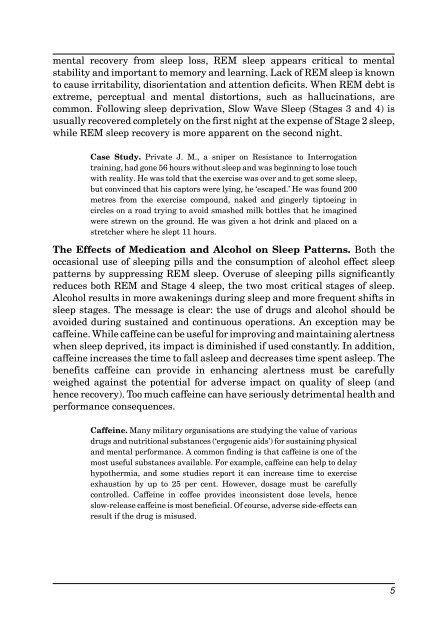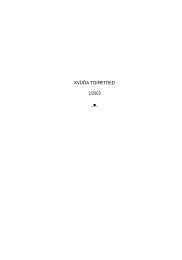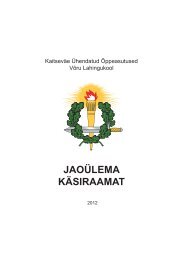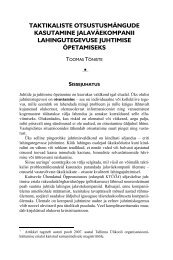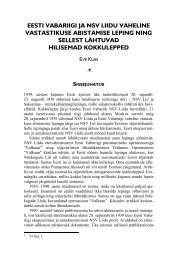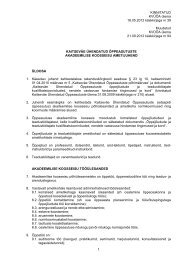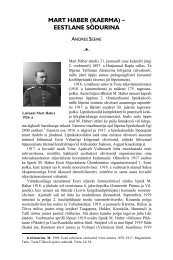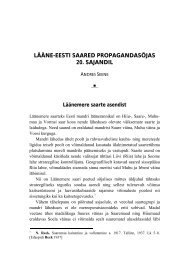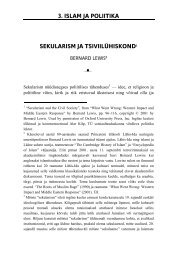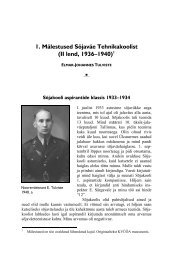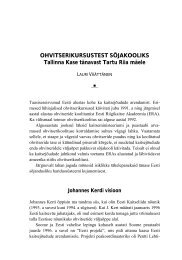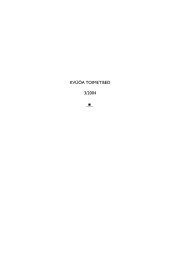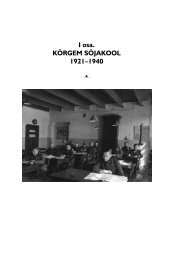Fatigue Management
Fatigue Management
Fatigue Management
You also want an ePaper? Increase the reach of your titles
YUMPU automatically turns print PDFs into web optimized ePapers that Google loves.
mental recovery from sleep loss, REM sleep appears critical to mental<br />
stability and important to memory and learning. Lack of REM sleep is known<br />
to cause irritability, disorientation and attention deficits. When REM debt is<br />
extreme, perceptual and mental distortions, such as hallucinations, are<br />
common. Following sleep deprivation, Slow Wave Sleep (Stages 3 and 4) is<br />
usually recovered completely on the first night at the expense of Stage 2 sleep,<br />
while REM sleep recovery is more apparent on the second night.<br />
Case Study. Private J. M., a sniper on Resistance to Interrogation<br />
training, had gone 56 hours without sleep and was beginning to lose touch<br />
with reality. He was told that the exercise was over and to get some sleep,<br />
but convinced that his captors were lying, he ‘escaped.' He was found 200<br />
metres from the exercise compound, naked and gingerly tiptoeing in<br />
circles on a road trying to avoid smashed milk bottles that he imagined<br />
were strewn on the ground. He was given a hot drink and placed on a<br />
stretcher where he slept 11 hours.<br />
The Effects of Medication and Alcohol on Sleep Patterns. Both the<br />
occasional use of sleeping pills and the consumption of alcohol effect sleep<br />
patterns by suppressing REM sleep. Overuse of sleeping pills significantly<br />
reduces both REM and Stage 4 sleep, the two most critical stages of sleep.<br />
Alcohol results in more awakenings during sleep and more frequent shifts in<br />
sleep stages. The message is clear: the use of drugs and alcohol should be<br />
avoided during sustained and continuous operations. An exception may be<br />
caffeine. While caffeine can be useful for improving and maintaining alertness<br />
when sleep deprived, its impact is diminished if used constantly. In addition,<br />
caffeine increases the time to fall asleep and decreases time spent asleep. The<br />
benefits caffeine can provide in enhancing alertness must be carefully<br />
weighed against the potential for adverse impact on quality of sleep (and<br />
hence recovery). Too much caffeine can have seriously detrimental health and<br />
performance consequences.<br />
Caffeine. Many military organisations are studying the value of various<br />
drugs and nutritional substances (‘ergogenic aids') for sustaining physical<br />
and mental performance. A common finding is that caffeine is one of the<br />
most useful substances available. For example, caffeine can help to delay<br />
hypothermia, and some studies report it can increase time to exercise<br />
exhaustion by up to 25 per cent. However, dosage must be carefully<br />
controlled. Caffeine in coffee provides inconsistent dose levels, hence<br />
slow-release caffeine is most beneficial. Of course, adverse side-effects can<br />
result if the drug is misused.<br />
5


